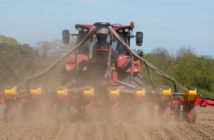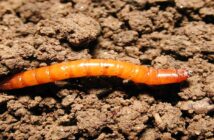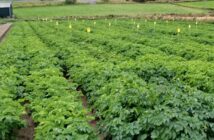With its strong disease resistance, Hants farmer Robert Brine hopes LG Astronomer could prove to be a more reliable and a potentially lower input Group 3 addition to the 1,200 ha arable operation at Moundsmere Farming Company.
Mr Brine is growing 40 ha of LG Astronomer for the first time this season, alongside another 58 ha of LG Illuminate, as he seeks to restore his faith in Group 3 varieties.
“Wheat is the mainstay of our varied rotation,” he explains. “We always put a decent percentage down to milling varieties, especially now that the newer ones are more reliable yield-wise, and there’s usually a reasonable amount of Group 4s. Group 3s have typically made up the remainder, but recently these have let us down a bit in terms of disease pressure.
“However, we liked the look of LG Astronomer and decided to give it a try, especially as its high disease scores on the AHDB Recommended List could make it a bit cheaper to grow.”
A small area was grown in a variety trial hosted on the farm last season, featuring 60m x 12m plots of more than 20 varieties from different breeders, all set within a field of LG Illuminate. “The variety trial is something we like to do every season, just as a bit of an experiment to see which varieties perform best on our farm. Everything is treated in exactly the same way as the rest of the farm.”
Several varieties struggled with disease and poor tillering in a challenging 2021 season, but both LG Astronomer and LG Illuminate were among those that fared better, giving Mr Brine confidence to grow a larger area of them for the coming harvest.
Showing good potential
The 40 ha of LG Astronomer follows winter beans, while his LG Illuminate is behind oilseed rape. Most crops were sown between the 9 to 12 October, at seed rates of 325/m2 and 340/m2 respectively, using a minimal non-inversion tillage system, based on one or two passes with a Köckerling tined cultivator.
Crops established strongly and came through last winter looking very well, Mr Brine recalls. Dry weather throughout April was a concern, but timely applications of digestate provided a useful boost to spring growth and greening. The LG Illuminate received digestate at the first main nitrogen timing in late February, while for LG Astronomer, it replaced the second main fertiliser dose in April.
“The digestate really kicked crops into gear and both varieties look like they have very good potential at this moment in time.”
The combination of a dry April and LG Astronomer’s strong RL scores for Septoria (6.8 on the three-year rating) and rust (8 for yellow and brown rust), did allow Mr Brine to make a slight saving on fungicides this season, as no T0 was applied. “We applied an early tebuconazole to the LG Illuminate at T0, but the LG Astronomer didn’t need anything.”
At T1, LG Astronomer received Ascra Xpro, while LG Illuminate was treated with Revystar XE (fluxapyroxad + Mefentrifluconazole) plus folpet. Both received Univoq (fenpicoxamid + prothioconazole) as the T2 flag leaf fungicide, while the T3 will depend on weather and yield potential.
Recognising wider benefits
Mr Brine says the resistance to Orange Wheat Blossom Midge (OWBM) in LG Astronomer and other LG varieties, is a particular benefit at Moundsmere, especially as the business moves away from using insecticides.
“Across the whole farm, we are moving more towards farming in a way that maximises the use of beneficial species, so insecticides are only ever used as an absolute last resort,” he says.
That environmental focus most recently saw the farm join an extensive Mid Tier stewardship scheme, featuring a range of options, including pollen and nectar mixes, winter bird food, cover cropping and overwinter stubbles.
Finally, Mr Brine also recognises the importance of LG Astronomer’s good standing power and resistance to sprouting, reflected by it having the highest scores for these characteristics among all Group 3s on the RL.
“We haven’t had problems with wheat on the ground for many years, but sprouting has been an issue for some wheats in the past, so it’s definitely a benefit of the LG varieties.
Looking ahead to next season, he says final varietal decisions will depend on how crops perform at harvest, but for now at least, it is “so far, so good”.




